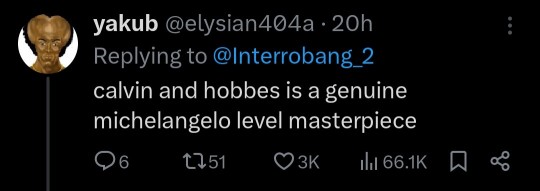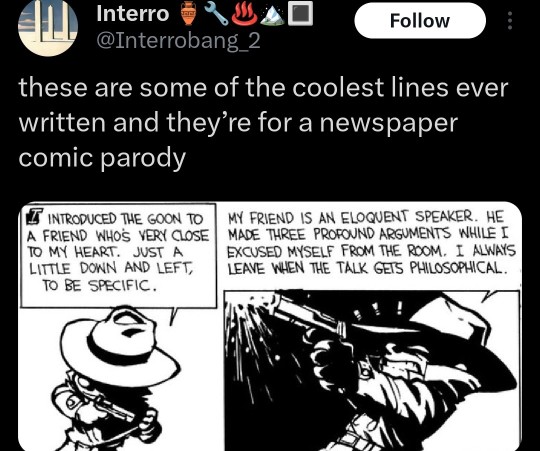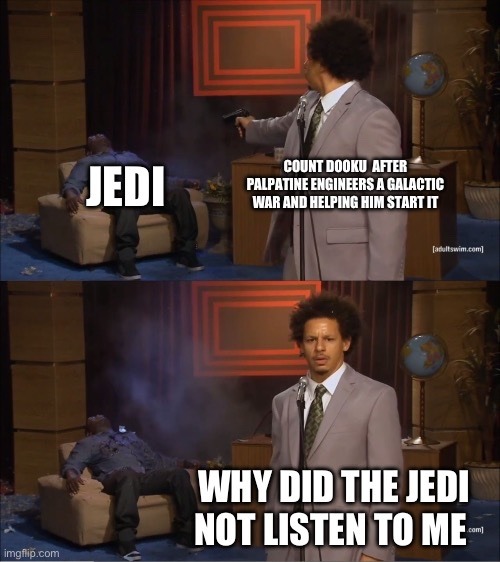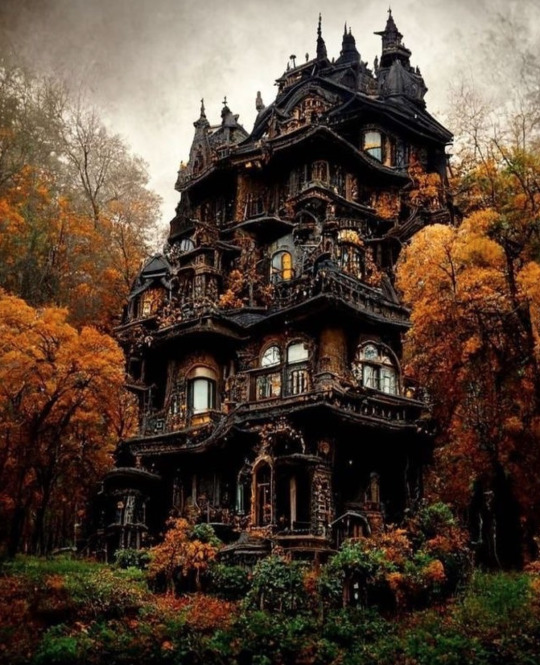Text
Meesa sexy and meesa know it
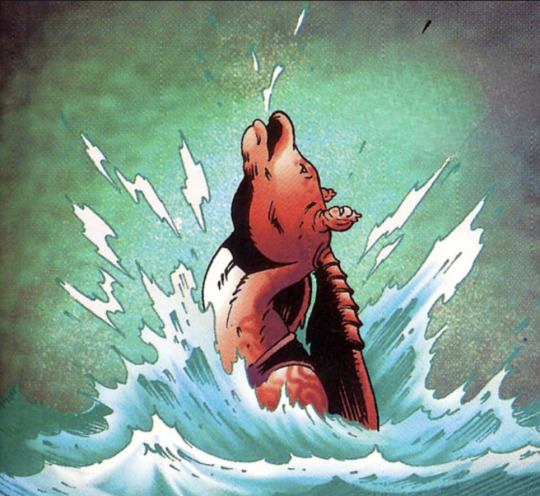

Jar Jar Binks emerging from water in Star Wars Episode I 1999-2000 Issue "Queen Amidala". Can you handle his wet look?
2 notes
·
View notes
Text
"Luke Skywalker isn’t like the old Jedi. He saves Vader with his attachments!”
Wrong!
Luke Skywalker, at the end of Return of the Jedi, after his confrontation with the Emperor drags Darth Vader through the destructing Death Star. He’s desperate, knuckles white under the heavy weight of his father’s body, a little boy dragging his dad to safety. He sets Vader down for a moment, to catch his breath or maybe to get a better grip. He goes to grab Vader again, but Vader, uncomfortable and in pain, asks Luke to take off the mask. He wants to see Luke through his eyes instead of the eyes Palpatine built for him. Luke refuses, says that removing the mask is a sure way for Vader to die. Luke doesn’t want Vader dead, he wants Vader alive. Not to hold him accountable for his many evil acts, but for the same reason why Luke Skywalker can’t kill Darth Vader; Vader is his father and Luke loves him.
And yet, after a moment, Luke removes Vader’s mask. He doesn’t want to, he hesitates, but he removes the mask with enough slowness to allow Vader to take it back. In that moment, Luke sets aside his desire for Vader in his life, sets aside his desire to see him live, and sets aside his entire mission, the reason he was even on the Death Star in the place. In his compassion for his father, Luke stays with Vader until he dies. It is this moment where we see him be the best damn Jedi he can be. I’d even argue that this moment is the greatest example of non-attached love we see. Because Luke lets Vader go! He lets his father die, and in some ways, by removing the mask, he too kills Vader, he stays with him until his last moment, gives him the kindness of granting his last wish and finally chooses Vader.
And Luke doesn’t have to do this. If Luke Skywalker’s love for his father was an attachment, he would ignore Vader and continue dragging him to the escape pod, put his desire for a father as his central focus and ignore Vader’s wants and discomfort. Maybe he would even save him. But he doesn’t. Instead, he watches as Vader dies.
He builds a Jedi burial for his father and watches it burn the remnants of Vader and Anakin Skywalker away. He mourns Vader, he mourns what they could’ve had as father and son, considers what ifs and maybe-if-I-did-this. Vader/ Anakin is released from his mortal body, from his ‘crude matter’ and Luke lets him go. He says one final goodbye to Anakin. Then, he joins Leia, Han, Chewie, Lando, and the rest of the Rebels and celebrates their victory. He lives in the present and celebrates what he has instead of what he lost.
Luke Skywalker is THE Jedi. Everything about Luke Skywalker serves as the foundational cornerstone of the Jedi, everything about the Jedi as a culture and philosophy is reflected in his character. Luke’s desire for the New Jedi Order isn’t to throw away the values of the old Order, but to vitalise them, breathe life back into dying lungs, and rebuild a path that people set out on their way to destroy. (Yes, his Order is different from the Old, but that’s because it has to be. He doesn’t have the resources or the safety of the Old Order.) The philosophies of the Jedi are difficult and they aren’t for everyone, and like the perfect Jedi that Luke is, he struggles and stumbles and sometimes he even rejects it. But, no matter how far he falls, it is a way of life he chooses again and again and again. It is a way of life that welcomes him back each time
1K notes
·
View notes
Text
“Anakin/Kylo/[random EU darksider] turned to the Dark Side because of past trauma/people being mean/bad influences. Circumstances made him evil, and therefore it’s not actually his fault or his responsibility and he deserved so much better.”
Ah ah ah ah ah ah ah.
Yeah, no.
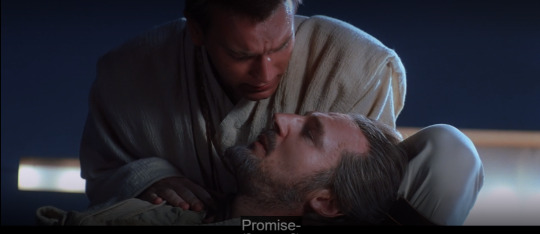
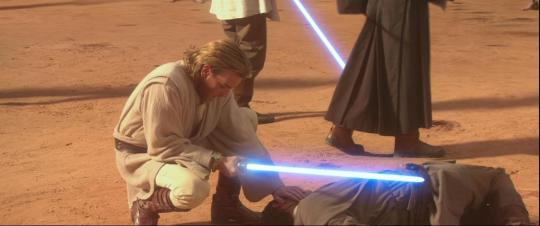
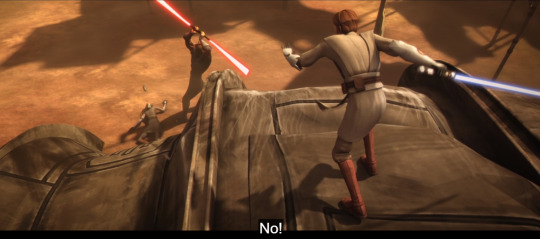



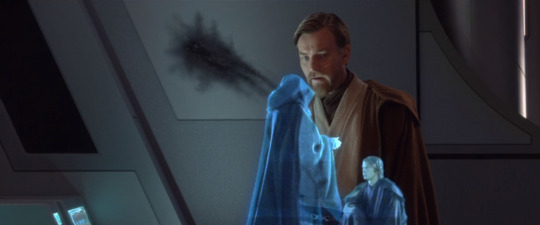

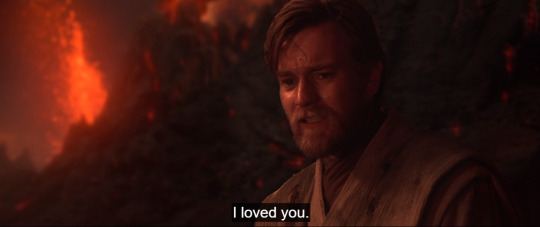


… And in the end he’s still smiling, rooted firmly in the Light.
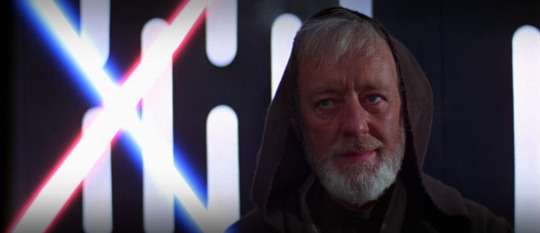
Obi-Wan Kenobi’s life is an absolute nightmare and the foil to every claim that living through terrible things justifies choosing to Fall.
4K notes
·
View notes
Photo
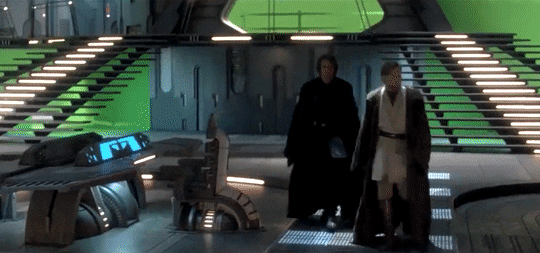

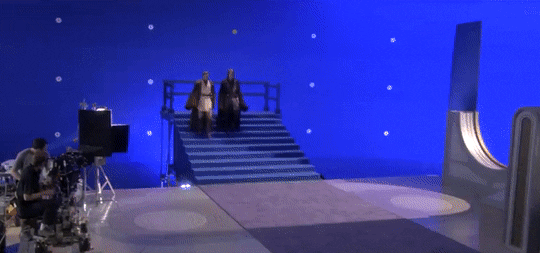
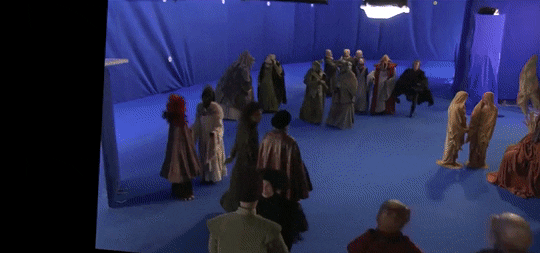
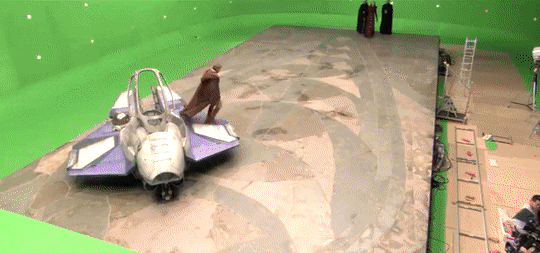

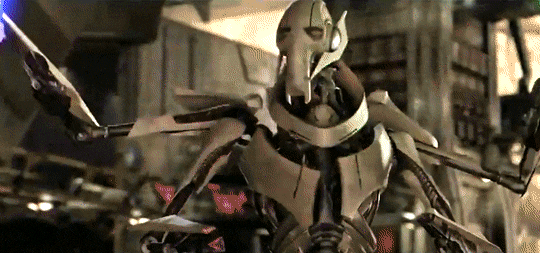
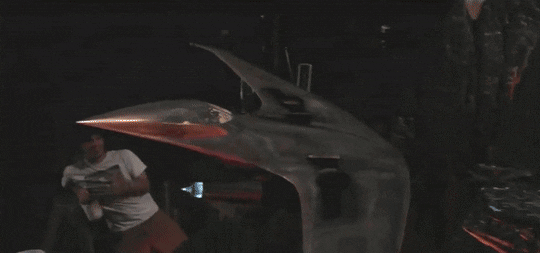
Star Wars: Revenge of the Sith | From Blue/Green Screen to Screen
1K notes
·
View notes
Text
I think it's interesting that - in order to make his "free-thinking Jedi" characters hold any semblance of rationality in their arguments - Dave Filoni needs to resort to artificially dehumanizing the other Jedi and painting them all with the same "we dogmatically worship protocol" brush.
He does this with Huyang in the recent Ahsoka episode.

"He's so narrow-minded, preachy and by-the-book, unable to think outside the box, just like the Jedi in the Prequels."
My first reaction was being amused at the fact that Filoni had to resort to making the Jedi Order's ideals and rules be embodied by a literal machine for his anti-Jedi headcanon to start making sense.
But then I remembered: Huyang isn't just any droid.
In The Clone Wars, he had a sassy personality, he had a pep in his step, he had a sense of humor...

This character was human in his behavior, he was fun and whimsical.
But now he's been reduced to, I dunno, "Jedi C-3PO"? Basically?
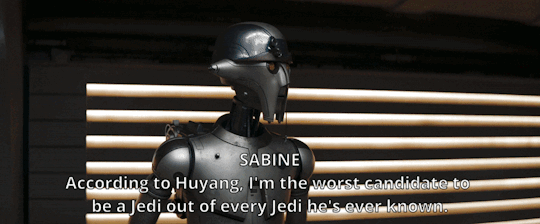
"Ha! He's blunt and unsympathetic because he's a droid, but it's funny because the Jedi were the same, they were training themselves to be tactless, emotionless droids."
And Filoni does this with Mace Windu too, in Tales of the Jedi.
Mace, who brought a lightsaber to the throat of a planetary leader to defend the endangered Zillo Beast...

... and who went waaay past his mandate by mischievously sneaking around Bardottan authorities and breaking into the Queen's quarters because he felt something bad was afoot...
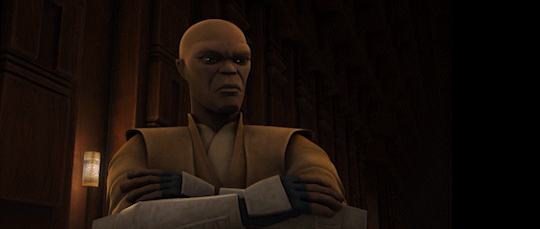
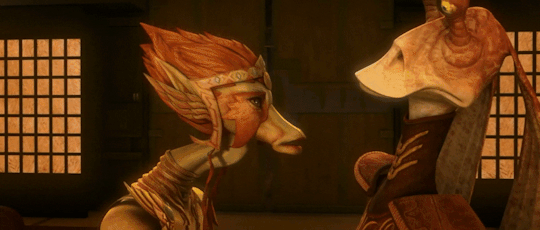
... was reduced to being an almost droid-like, rule-parotting, protocol purist who sticks to his instructions (and is implied to be willing to let a murder go unsolved so he can get a promotion).
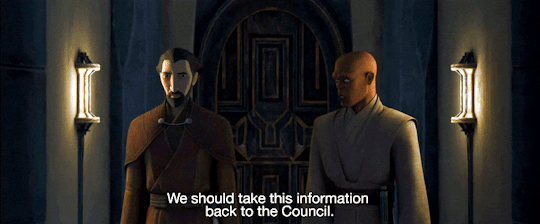
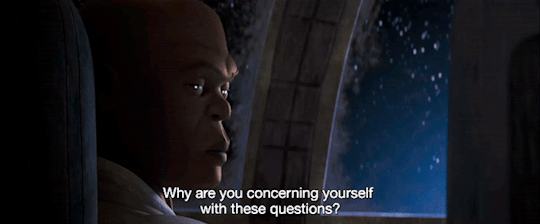

I mentioned this at the end of my first post on Luke in The Last Jedi... while changes in personality do happen overtime and can be explained in-universe... if you don't show us that progression and evolution and just leave us without that context, that'll break the suspension of disbelief, for your audience.
Here, we have two characters with a different (almost caricatural) personality than the one they were originally shown to have.

Now... we could resort to headcanons, to make it all fit together.
We could justify Huyang's tone shift 'cause "Order 66 changed him". And we could make explanations about TotJ's Mace:
Being younger and thus more ambitious and a stickler for the rules, and only really becoming more flexible after getting his seat on the Council and gaining more maturity.
Being such a teacher's pet in the episode because we're seeing him through the eyes of a notorious unreliable narrator, Dooku.
There'd be nothing wrong with opting to go with either of those headcanons to cope with this. After all, Star Wars is meant to help you get creative.
But the problem I encounter is that:
Filoni has an anti-Jedi bias, so the above headcanons clearly wouldn't really track with his intended narrative.
We'd be jumping through hoops to extrapolate and fill in what is, essentially, inconsistent characterization, manufactured to make Ahsoka and Dooku shine under a better light.
And that sours whatever headcanon I come up with.
Edit:
Also, yeah, as folks have been saying in the tags... wtf is "Jedi protocol"? The term isn't ever mentioned in the movies, I skimmed through dialog transcripts of TCW, never saw it there.
So it's almost as if - if Filoni wasn't draining characters like Mace and Huyang of all humanity and nuance - his point about "the Jedi were too detached and lost their way, but not free-thinkers like Qui-Gon, Dooku and Ahsoka" wouldn't really hold much water.
554 notes
·
View notes
Text
the concept of "grey Jedi" doesn't work because the force is light and dark, not black and white. By definition, colour value might be a spectrum, but darkness is absence of light. Everyone is grey! Star wars has clearly implied that nobody is perfect and everyone comes in shades of of grey, everyone is flawed and imperfect. The jedi are all technically grey! However, they are "light" because they, as jedi, choose light, choose selflessness, choose goodness.
Textbook fandom interpretation of "grey jedi" is either A. Someone who uses both the dark and light side or B. Someone who is light and does good but doesn't follow the jedi order.
A. doesn't work, because the dark side isn't just defined by "being emotional" or "Thinking of yourself", it's literally stuff like murder and torture. You can't claim to be "good" or "light" or "better than everyone" while also condoning murder at the same time.
B. You don't have to be a jedi to use the force! You don't have to be a jedi to be in the light! Like it's not illegal, the jedi order respects non-jedi force users as long as they don't commit human rights violations! the Jedi are the majority of force users, but they're not the only ones who can use the force. The jedi themselves are aware that there are many different interpretations, and the only intervene when it. yknow. involves murder and torture and the like. calling non-jedi lightside users as "grey jedi" doesn't really make sense because they're... just technically normal jedi. And if they're not associating with the order, then they're just lightside force users that are not jedi? Why would they call themselves jedi if they themselves don't think they are jedi or associate with the jedi???
Like in Ahsoka's situation, she's not a "grey" jedi, she's a light force user that doesn't follow the jedi order. In fact, saying that she's a "grey" jedi is basically just saying that she's a regular jedi? That doesn't make her better or worse or special, disagreeing with the council doesnt make someone better or worse that the other- what does matter is her actual actions. Which, as aforementioned, is lightside. The jedi order is also light. They can coexist, yknow, one is not superior than the other, they're both light. And it's not uncommon for people to disagree with the council. That's the entire point of the jedi having a "council"- to provide different perepectives and healthy debate and come up with the best decision for everyone. You can't please everybody, that's entirely normal. There's a reason why the council discusses instead of having one person make all the choices. The jedi are people too, they're also flawed. You can be grey and choose light, that's what the jedi choose to do.
tldr everyone is already grey, but light and dark is a matter or choice.
487 notes
·
View notes
Text
Honestly, people can criticize Lucas’ dialogues as much as they want, but the scene read as Anakin trying to manipulate Padmé is something I always saw as the fandom’s very own creative failure. In this way, the scene just doesn’t make any sense.
“Padmé asks Anakin if love was forbidden for the Jedi. Anakin, wanting to convince Padmé to start a romantic relationship with him, admits the Jedi forbidden to form attachment and possess people, but bending the truth by defining the core teaching of the Order, compassion as “unconditional love”, claiming they are in fact, encouraged to love. But in reality, the Jedi can’t love people at all.”
All Anakin says is “Oh, no, the Jedi can love. Moreover, the Jedi should love people.”
Is this a bit suggestive? Sure. There is a certain “Oh, I can love. Wink, wink” vibe.
But there is no real romantic context in the scene.
He is talking about compassion. How the definition of compassion given by Anakin could be a personal understanding of the term? How else could one define compassion? How can you not encouraged to love, if compassion is central to the Jedi’s life? How one could conclude that the Jedi are forbidden to love, because they shall not form attachment… only be compassionate? How is compassion not love? If one is compassionate, how could they not love? Based on this, how on earth could attachment mean love in this context?
And how all of this lecture would lead Padmé into Anakin’s arms? He is talking about compassion, not romance. Maybe indicates the possibility, but their discussion is not about romantic love. It comes up when Anakin says “I can’t be with the people I love.” Not “the one I love” or the “person I love”. He says “people”. If he means romance, this would mean that Anakin is polyamorous.
Critical thinking- you're doing it wrong
Friendly reminder that the Jedi views on attachment and love immediately cleared up in the exact same scene and dialogue when the subject was first brought up in the franchise:
PADMÉ: Are you allowed to love? I thought that was forbidden for a Jedi.
ANAKIN: Attachment is forbidden. Possession is forbidden. Compassion, which I would define as unconditional love, is central to a Jedi's life, so you might say we're encouraged to love.
But many fans decided that Anakin must be lying in order to trick Padmé into a relationship. In the same time, when Darth Sidious started to bad-mouth the Jedi, considerable part of the fandom blindly believed him.
103 notes
·
View notes
Text
“Jedi will just say, ‘Oh, this was a test from the Force.’ when anything happens or say ‘May the Force be with you.’ to someone who’s not a Jedi.” I mean, yeah, they do. Because the Force is a demonstrable, provable thing that tests Jedi all throughout their lives and moves through them and bolsters them. That’s literally how it works in-universe, the Jedi aren’t just going on faith that the Force exists or that it sends them trials, it’s literally what the Force does to Luke on Dagobah, the Jedi on Ilum, Ahsoka and Kanan and Ezra on Lothal. The Jedi are not pulling “the Force is testing me” out of their asses, it’s genuinely just what the Force does.
1K notes
·
View notes
Text
The Jedi: You know we should probably make the Chancellor step down, as he’s become really powerful and shows no signs of reliquishing any of his emergency powers. We really don’t want to have to do this but if we don’t it could lead to tyranny across the Galaxy.
“Oh my gosh! Look at how corrupt and evil the Jedi have become, conspiring to remove the Chancellor from power! See, Palpatine was right! They’re planning to take over.”
Palpatine: Uses said emergency powers to name himself Emperor, genocides the Jedi, enslaves the Galaxy, builds a planet destroying weapon and violently conquers neutral systems.
“��� It’s the Jedi’s fault.”
323 notes
·
View notes
Text
"Does it make sense?"
I think, ultimately, the thing that it comes down to for why I just can't see "the Jedi are intentionally written as dogmatic/dispassionate" or "Obi-Wan failed Anakin" or "the Jedi brought their own downfall" reads as valid anymore is because... it makes no sense that George Lucas - of all people - would write that.
Like, this is the guy who preaches the same lessons and philosophies that the Jedi do in the Prequels, every chance he gets (sometimes going all the way back to American Graffiti).
So ask yourself:
Does it make sense that he would intentionally make the characters to whom he gave his own values "dogmatic"?
He's a self-proclaimed "methodist-Buddhist". The Jedi are based on Buddhist monks.
youtube
Does it make sense that the buddhist would write a story about space-buddhists being "emotionless", "devoid of compassion" and "at fault for their own genocide"?
Lucas had an apprenticeship, that turned into a friendly/brotherly bond with his mentor Francis Ford Coppola. Their personalities were completely opposite (Coppola was more outgoing, George was more prudent) but they worked in sync, they completed each other.
youtube
Do you really think that this guy's intended narrative would be that "Qui-Gon would've been better-suited for Anakin as a teacher than Obi-Wan because the latter was prudent/strict and too different from the more passionate Anakin"?
George lays Anakin's downfall on Anakin's shoulders almost every time he talks about it. It's a corruption that was caused from within, he would be able to love without getting attached if he had joined the Jedi at an earlier age, but he didn't so his attachment and greed results in his turn to the Dark Side.
youtube
So does it make sense that Lucas' narrative would be that "the Jedi (aka EXTERNAL forces) pushed, denied and failed Anakin that they caused him to turn" instead of "it was Anakin's own fault because he wasn't able to let go"?
He has said multiple times that, aside from Anakin's downfall, the Prequels center on the Republic's downfall, never mentioned the Jedi once when describing what the Prequels are about.
youtube
If the Prequels were actually about "the fall of the Jedi and how they lost their way", wouldn't he have brought it up once?
And would he really have focused so much on the Senate and politics rather than adding more development to characters like Mace and Yoda?
I think the answer to all of these is "no".
Here's one more: Lucas stated so many times that this was a fairy tale, that all six Star Wars movies are meant for kids. The situation of the Prequels is more complex than the one in the Original Trilogy, but before, during and after the Prequels Lucas confirmed that the Star Wars morality is binary, it is black and white, good vs bad.
Would he really intentionally make the Prequels this subversive story wherein "actually, if you stop and think about it, the good guys are really the bad guys"?
Or is it just that:
We live in a time where movie audiences expect the "good guy" to be individualistic, flawed and non-conformist, and the Jedi are a community of nigh-incorruptible champions of good who've already completed their character arcs.
So the adults (aka not the target audience) who watched the Prequels at the time were turned off by these characters who they perceived as "holier than thou", having been conditioned by the times they lived in to think that there are skeletons in "Mr. Perfect's" closet.
Thus, they retconned the films (via comics, books, games and episodes) so that they could enjoy the Prequels more, and did so by:
injecting more realistic "gray morality" themes into the films and
projecting an oppressive "boys don't cry" philosophy onto the Jedi.
For lack of a better metaphor, "they put a skeleton in Mr. Perfect's closet so that they could finally find his existence bearable, and keep bringing up that skeleton to this day."
278 notes
·
View notes
Text
"I relate to the villain so therefore they must not actually be bad/it's bad writing that they're made out to be a villain"
No.
You relate to the villain, which is a reminder that anyone from any background has the potential to do good or to do bad, and that evil is not an inherent trait but rather someone just like you making a series of decisions to put what they want above everything else.
541 notes
·
View notes
Text
More George Lucas debunking misconceptions about the Prequel Jedi:
"Anakin killed the Jedi in retaliation. They failed him, betrayed him and didn't allow him to have a relationship, so he killed them all."

"[In Revenge of the Sith] The controversy is going to be that people expect some horrible, horrific thing to happen to [Anakin] that caused him to [become Darth Vader]. It's much subtler. It's something that everybody faces— when you're looking at yourself, you can see your good and your bad, and say, "Is this a selfish choice or is this a compassionate choice? And once I get something, what would I do to keep from losing it? Would I make a pact with the devil to keep it?"
- Entertainment Weekly #785, 2004
"… some of the people had a hard time with the reason that Anakin goes bad. [...] They wanted a real betrayal, such as, "You tried to kill me so now I'm going to try and kill you." They didn't seem to understand the fact that Anakin is simply greedy. There is no revenge."
- The Making of Revenge of The Sith, page 188

"The rest of the Jedi have dogmatically forgotten how to love out of fear of having attachments, Qui-Gon is the only one who knows that you can love people selflessly, without getting possessive."

"The fact that everything must change and that things come and go through his life and that he can't hold onto things, which is a basic Jedi philosophy that he isn't willing to accept emotionally and the reason that is because he was raised by his mother rather than the Jedi. If he'd have been taken in his first year and started to study to be a Jedi, he wouldn't have this particular connection as strong as it is and he'd have been trained to love people but not to become attached to them.
But he has become attached to his mother and he will become attached to Padmé and these things are, for a Jedi, who needs to have a clear mind and not be influenced by threats to their attachments, a dangerous situation."
- Attack of the Clones, Director’s Commentary, 2002
"Obviously, it’s a progression. But in [Attack of the Clones], you begin to see that he has a fear of losing things, fear of losing his mother. And as a result, he wants to begin to control things, he wants to become more powerful. And these are not Jedi traits. And part of this is because he started to be trained so late in life, that he had already formed these attachments. And for a Jedi, attachment is forbidden. You can love people, but you have to love them unconditionally, in terms that you can’t hold on to them."
- CNN, “Countdown to the Clones”, 2002
"The Jedi are trained to let go. They're trained from birth. They’re not supposed to form attachments. They can love people - in fact, they should love everybody. They should love their enemies; they should love the Sith. But they can't form attachments. So what all these movies are about is: greed. Greed is a source of pain and suffering for everybody. And the ultimate state of greed is the desire to cheat death."
- The Making of Revenge of The Sith, page 213
"Ultimately for a Jedi Knight, it’s very easy to give up. One of the things they give up is marriage. They can still love people. But they can’t possess them. They can’t own them. They can’t demand that they do things. They have to be able to accept the fact, one, their mortality, that they are going to die. And not worry about it. That the loved ones they have, everything they love is going to die and they can’t do anything about it."
- Celebration V, Main Event, 2010

"The Jedi in The High Republic are the Jedi in their prime/heyday. By the time of the Prequels, they've become political and dispassionate/prohibitive."

"[In Phantom Menace] you see the heyday of the Jedi, when they are the guardians of peace and justice in the galaxy, sort of like the old marshals out West. And there's thousands of them."
- Vanity Fair, 1999
"We've actually never seen real Jedi at work, we've only seen crippled half-droid half-men, and young boys that had learned from these old people. So to see a Jedi in his prime fighting in the prime of the Jedi, I want it to be a much more energetic and faster version of what we've been doing."
- The Phantom Menace, “Fights”, 2001
"Jedi Knights aren't celibate - the thing that is forbidden is attachments - and possessive relationships."
- BBC News, 2002
"[When Obi-Wan talks to Anakin about politicians, we learn about] the Jedi’s disenchantment with the political process, due to the corruption and the ineffectiveness of the Senate."
- Attack of the Clones, Director’s Commentary, 2002
"The Jedi aren't really allowed to be involved in the political process. They're [present in the Senate when Palpatine is given emergency powers], but they can't suddenly step up and say, "No, no. You can't do that." They have to let the political process go."
- Attack of the Clones, Commentary Track #2, 2002
790 notes
·
View notes

